

Health and disease are processes and actions defined by genetic and epigenetic factors that impact functional performance and phenotypes. For Cedrus Therapeutics, functional performance and phenotypes are comprehensively reflected in the action patterns of living functional systems. The transitions between these patterns dictate disease onset and progression, and open opportunities for disease-modifying therapeutic interventions.
Stem cells are the basic units of structure and function for life. They generate live functional systems. They can be found within the human body at all stages of human life, before and after birth. They integrate, compute and process inputs from internal and external signals. They control the balance between regeneration, expansion and decline. Therefore, they are central to disease onset and progression in all therapeutic areas including neurodegeneration, neuroinflammation and oncology.
We research and develop therapeutics to act on stem cells and their derivatives in vivo as a means of stimulating regeneration and repair in vivo. Future medicines of this kind are considered to have disease-modifying potential, but they may even have the capacity to cure disease and restore health.

Parkinson’s disease is a progressive neurodegenerative disorder. Parkinson’s disease is most common among the elderly, but can also occur in middle-aged and, though rare, in young adults. Parkinson’s disease affects the central nervous system and impairs motor skills, speech, and in its later phases, mood, non-motor and cognitive functions. The symptoms develop slowly over several years and are mild in the beginning, but worsen over time.
Parkinson’s disease is a serious neurological condition, for which there is not yet a cure. Current treatments – including drugs, physical therapy, and surgical interventions – focus on controlling symptoms, relieving disabilities and improving quality of life. Parkinson’s disease symptoms are directly caused by the deficiency of dopamine, an essential chemical messenger in the brain. A progressive loss of dopamine neurons is a defining feature of Parkinson’s disease. Current drug treatments target dopamine deficiency. They restore brain levels of dopamine, either directly or indirectly, or mimic dopamine to stimulate the dopamine system in the brain. Cell therapy and transplantation of stem cells or dopamine-producing cells to treat Parkinson’s disease are in experimental stages. Proof-of-principle studies have been reported, but cell transplantations are costly and logistically demanding procedures.
Our Solution. Cedrus Therapeutics takes the stem cell concept one step further. We are searching for drugs and drug combinations to regenerate functional dopamine neurons in the brain by stimulating stem cells and precursor cells that are always present in vivo.
Our academic partners have shown that stem cells in adult tissues rapidly respond to pharmacological manipulation with clear benefits in animal models of Parkinson’s disease. These results suggest that clinical benefit can be achieved by stimulating adult stem cells by drugs. Cedrus Therapeutics continues translating this therapeutic concept into novel drugs. We screen disease-relevant cellular assay systems to find novel chemicals and biologicals with pharmacological properties. Access to defined patient populations enables Cedrus Therapeutics to develop genotype-selective, disease-modifying drugs and drug combinations for the effective treatment of Parkinson’s disease.
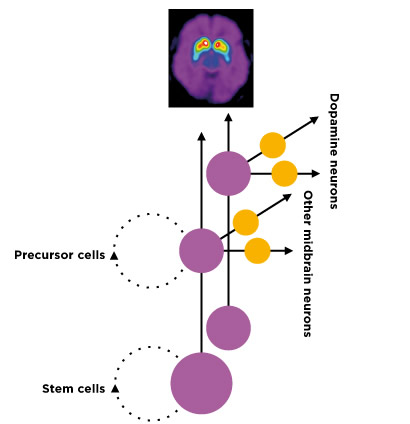
Stem cells and precursor cells give rise to functional dopamine neurons in vivo. Future drugs direct endogenous stem cells and precursor cells to regenerate dopamine neurons


Alzheimer’s disease is a progressive, fatal neurodegenerative disease that develops over years. In early stages, Alzheimer’s disease affects memory, thinking and concentration. But the symptoms of mild cognitive impairment gradually expand to changes in mood and behavior, changes in personality, and to a decline in cognitive and motor function. Alzheimer’s disease ultimately leads to a severe loss of mental function. Although not all memory loss indicates Alzheimer’s disease, one in eight people aged 65 and older, and one in two people over 85, have Alzheimer’s disease. Disease progression in Alzheimer’s disease is accompanied by loss of neuronal function and by neuronal cell death.
There is currently no cure for Alzheimer’s disease or any treatment to stop its progression or reverse the symptoms. Drug therapy aims to slow disease progression and treat symptoms associated with the disease. Clinical studies indicate that these drugs generally have only modest benefit and may help on a short-term basis (6 months to a few years) to slow cognitive decline.
Cedrus Therapeutics is developing novel disease-modifying drugs that stop or reverse the course of Alzheimer’s disease. These drugs are to induce the formation of new neurons and to help neurons survive in vivo, thereby re-establishing neural circuitry, neuronal signaling and neuronal function. We design disease-relevant assay systems to search for specific drug candidates for selected patient populations in defined disease stages.
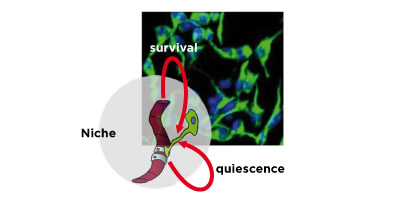
In the stem cell niche, signals from the vascular system orchestrate cell survival and quiescence

Multiple sclerosis is a complex chronic disease that affects some 2.5 million people worldwide and is roughly 2.5 times more common among women than men. Onset occurs between the ages of 20 and 50 years in 70% of patients with the average age approximately 30. From a clinical, pathological and radiographical perspective, multiple sclerosis is a heterogeneous disease with ongoing autoinflammation and neurodegeneration, even from early stages. Patients with multiple sclerosis report diverse symptoms ranging from fatigue to depression; from tingling, numbing, or burning sensations to visual problems; from walking and gait problems to general muscle weakness and stiffness; from swallowing to speech problems; from bladder and bowel dysfunction to sexual dysfunction; and from cognitive and memory problems to depression. The course of the disease varies among patients. The disease may be mild, moderate or severe.
Current drug treatments are anti-inflammatory, immunomodulatory or immunosuppressive. Most of these drugs are taken on a long-term basis and have significant side effects. These drugs, however, can be considered disease-modifying since they help reduce the frequency and severity of relapses and exacerbations, and slow disease progression and disability. They can help reduce disease activity and progression for relapse-remitting multiple sclerosis, the most common form of multiple sclerosis, and other types of multiple sclerosis that have relapses (secondary-progressive form, progressive-relapsing form). At this time, there are no proven treatments for primary-progressive MS, nor any drugs that address directly the neurodegenerative components of multiple sclerosis.
Cedrus Therapeutics is developing disease-modifying therapies to target the cellular components of the central nervous system and their interplay among one another and with cells of the immune system. We are searching for drugs to promote special cells, so called oligodendrocytes, and their precursor cells to differentiate and to produce sheaths to protect nerve fibers. We employ dynamic cellular assay systems derived from selected patient populations with defined forms of the disease. We will first address the medical need for primary-progressive multiple sclerosis, and then expand to the other forms of the disease. Such drugs are intended to prevent or slow disease progression and to restore neuronal function.
Cedrus Therapeutics also leverages its technology platform to find novel combination therapies for patients with relapse-remitting forms of multiple sclerosis. We are searching for drug combinations for particular immuno- and/or neurophenotypes in selected patients and/or specific disease stages. These drug combinations are designed to improve the efficacious treatment response and/or to limit the side effects and toxicity of current therapies.
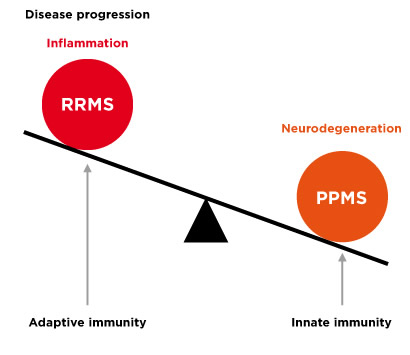
Future drugs for Multiple sclerosis target not only the innate immune system but also the CNS components

Cancer drugs with clear therapeutic efficacy and a minimum of toxicity are challenging to find for several reasons. Firstly, cancer-specific single molecular targets are rare. Most mutated oncogenic proteins are also present and functional in normal cells, and selective inhibition of the mutant protein can be difficult. Secondly, genetic and epigenetic changes in cancer cells effect not only protein expression, but also the interaction network and the cell logics, and thus the relative dependence on specific proteins. Proteins that are non-essential for cell signaling or cell metabolism in a normal cell may become essential in a cancer cell with a rewired signaling network. Thirdly, tumor cells often adopt signaling and metabolic strategies of multiple targets and interlinked pathways versus single targets and linear pathways. Technology limitations have hindered the identification and targeting of subtle, but functional differences in cancer cells. It is difficult to follow dynamic changes in the network structure and function of cancer cells during disease progression or treatment and also to develop therapeutic strategies based on robust experimental data.
Current cytotoxic anticancer drugs inhibit essential functions that are present in both normal and cancerous cells and therefore have narrow therapeutic windows associated with toxicity and limited therapeutic efficacy.
Although current targeted anticancer therapeutics have more manageable side effect profiles than cytotoxics, they often offer limited clinical efficacy. Both receptor-specific antibodies and anticancer kinase inhibitors often address protein targets, such as ABL, EGFR and ERBB2, which are differentially expressed, but often non-essential in cancer. Targeted anticancer therapeutics are therefore only effective for selected patients. They are not effective at all in specific patient subsets despite pathway alterations. Often targeted anticancer therapeutics induce resistance and escape mechanisms in specific patient groups.
Current clinical trials for combination therapeutics and administration sequences may follow rational strategies to interfere with cancer pathways but they are not guided by experimental data from translational research. Advances in cancer combination therapies were (and are) primarily developed empirically.
Cedrus Therapeutics addresses the challenges of current anti-cancer drug development and therapy. Our strategy is to find anti-tumor drugs, and drug combinations and therapeutic sequences that target proteins, protein combinations or interactions that are essential in cancer cells but non-essential in normal cells. Our oncology platform provides a technology solution to explore genotype-drug and drug-drug combinations systematically and efficiently. We are searching for genotype-selective single-agent anticancer drugs and drug combinations and intend to enhance the therapeutic window of current targeted cancer therapeutics, thereby eliminating cancer cells efficiently and safely. We are addressing the relationship between kinetics and systemic responses to drugs and drug combinations since dosing sequence and interval may have dramatic effects on efficacy. We intend to improve the therapeutic window of cancer drugs by leveraging cell intrinsic and cell extrinsic differences, thereby sensitizing cancer cells.
Our oncology program starts and builds from tumors with defined genetic make-ups rather than from specific cancer indications. Therefore we pursue multiple cancer indications including colorectal carcinoma, glioblastoma, lung cancer, prostate and endometrial cancer, and renal cell carcinoma. Our oncology program is designed to deliver specific, experimentally corroborated drugs and, drug combinations and therapeutic sequences, thereby increasing the market share and expanding the therapeutic use of current targeted anticancer drugs to semi-responders, non-responders, refractory and secondary resistant patients.
Our oncology approach provides significant upside potential to also find drugs for the treatment of inflammatory disease, neurodegenerative diseases and diabetes.
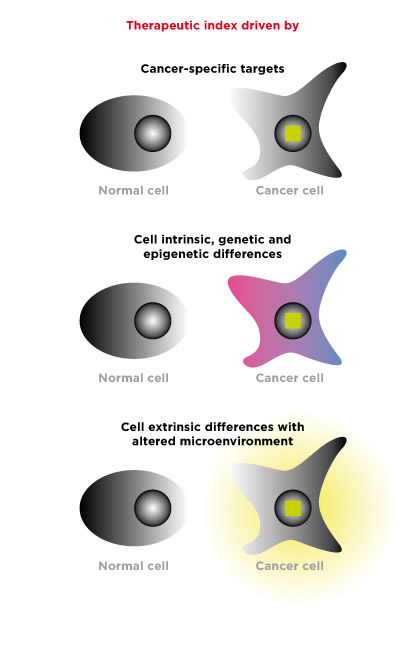
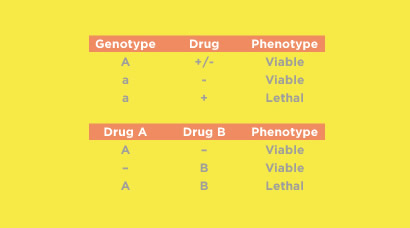
Future cancer drugs or their sequential combination increase the efficacy and reduce the side-effects in defined patient populations
